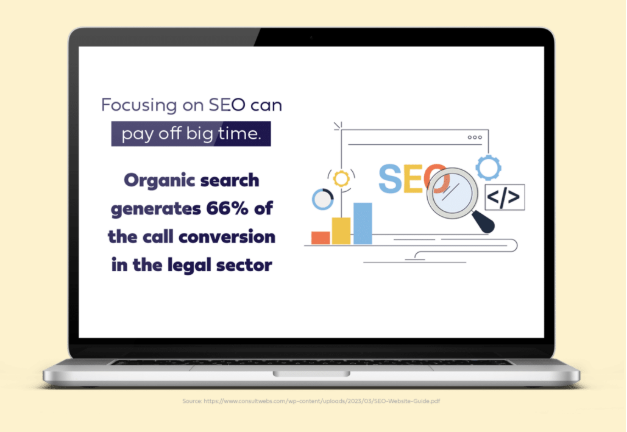SEO for Legal Practices: Proven Strategies to Win Clients Online
Legal practices operate in one of the most competitive digital landscapes. With countless firms offering similar services, visibility alone doesn’t guarantee clients.
Instead, success lies in positioning your practice as trustworthy, authoritative, and accessible online. That’s where SEO becomes a core part of growth strategy.
For law firms, the stakes are higher than in most industries. Clients rarely shop around for weeks; they often make quick decisions based on credibility, search visibility, and first impressions of your website.
Even a beautifully designed legal website risks underperforming if it isn’t optimized to capture relevant search intent. Effective SEO can ensure your digital presence doesn’t just look good but also drives meaningful client engagement.
The Importance of SEO for Legal Practices
SEO is especially critical for law firms because client intent is highly specific. Someone searching “Cincinnati personal injury lawyer” isn’t casually browsing. They’re looking for immediate representation.
Ranking well for these targeted queries translates directly into client opportunities.
The legal sector is also one of the most expensive niches for paid ads. Relying on PPC alone quickly drains budgets without guaranteeing long-term returns. SEO provides a more sustainable path to client acquisition by building organic visibility.

Trust is another cornerstone. A law firm’s credibility begins before the first consultation, often at the search results page. Appearing consistently across organic results, local packs, and legal directories signals authority.
In short, aside from driving traffic, SEO also builds recognition, reduces dependency on costly ads, and positions legal practices as trusted authorities in their communities.
Core SEO Strategies for Law Firms
Legal SEO goes beyond keyword stuffing or generic optimization. Because clients often search with urgency and specificity, law firms must employ strategies that balance visibility with authority. Let’s break down the most critical areas.
Local SEO Dominance
For most firms, the battle is won or lost in local search results. Ranking in the Google Local Pack can drive more qualified leads than national visibility ever could.
Building local dominance involves precise NAP consistency across directories, optimizing Google Business Profile listings, and generating authentic client reviews.
Hyperlocal content (like blog posts on recent local legal cases or state-specific laws) signals both relevance and authority. It creates an edge against larger firms that may overlook community-focused visibility.
Content Marketing with Authority
Legal clients aren’t looking for generic advice. They want clarity backed by expertise. Content must reflect the authority of licensed professionals while remaining accessible.
High-performing legal content often takes the form of in-depth guides, FAQs, and case explainers that target long-tail queries like “Ohio child custody modification process.” These queries attract visitors with real intent.
Authority is amplified when content integrates citations from statutes, precedents, or trusted legal institutions. Beyond organic rankings, this builds credibility with prospective clients and reinforces professional trust.
Technical SEO and Website Performance
A law firm website can’t afford technical inefficiencies. Page speed, secure HTTPS connections, and mobile responsiveness directly influence both rankings and conversions. Even a two-second delay in load time risks losing a client who is urgently seeking representation.
Schema markup, particularly for legal services, enhances how search engines interpret content. Features like attorney bios, reviews, and practice areas can appear as rich snippets, increasing click-through rates.
Site architecture also matters. A clean hierarchy allows users (and crawlers) to navigate seamlessly from broad practice areas to niche services, minimizing friction and maximizing visibility.
Link-Building with Trust
In the legal sector, backlinks are reputational assets. A link from a respected legal directory, bar association, or news outlet carries far more weight than a random blog link.
Building these links requires a strategy rooted in credibility. Publishing thought leadership articles, contributing expert quotes to journalists, and sponsoring community events often generate natural, high-quality mentions.
The focus should remain on relevance and authority. A handful of well-placed links from trusted industry sources can outperform hundreds of weaker backlinks in both SEO impact and professional perception.
The Role of Web Design in SEO for Legal Practices
While SEO drives visibility, web design determines whether visitors convert into clients. For legal practices, design and optimization are inseparable. Clients judge credibility within seconds, and search engines reward user-friendly sites.
Aesthetic appeal is only the surface. Search engines measure how users interact with your site, making design decisions a direct ranking factor. Navigation, speed, and mobile performance all influence both rankings and client trust.
Key design elements that strengthen SEO for law firms include:
- Clear Navigation: Structured menus that separate practice areas, FAQs, and contact options reduce bounce rates and improve dwell time.
- Conversion-Oriented Layouts: Prominent call-to-action buttons, streamlined intake forms, and visible phone numbers encourage immediate client engagement.
- Mobile Optimization: Many clients search for legal help on-the-go. A responsive layout ensures the site functions seamlessly across devices.
- Trust Signals: Attorney bios, client testimonials, and case highlights provide reassurance, while schema markup makes these elements machine-readable.
- Accessibility & Compliance: ADA-friendly design and secure HTTPS connections not only support inclusivity but also align with Google’s quality signals.
In practice, an award-worthy legal website isn’t just visually polished. It’s strategically engineered to balance design elegance with SEO-driven functionality.
Measuring SEO Success for Law Firms
Tracking SEO success in the legal sector requires more than vanity metrics. Since client acquisition is the ultimate goal, firms must focus on KPIs that tie directly to visibility, trust, and conversion.
Key indicators include:
- Organic Traffic Growth: A steady increase signals stronger visibility in competitive search results.
- Local Pack Rankings: Dominance in Google Maps and local queries reflects effective local SEO strategies.
- Conversion Rate from Organic Leads: Measuring calls, form submissions, or consultations booked directly from search traffic.
- Keyword Visibility for High-Intent Phrases: Ranking for terms like “Cincinnati divorce lawyer” or “personal injury attorney near me.”
- Backlink Quality and Referring Domains: Authority-driven links from legal or regional sources.
- Engagement Metrics: Bounce rate, time on site, and page depth highlight whether users find content valuable.
Common SEO Mistakes Law Firms Make
Many law firms fail not because they ignore SEO, but because they execute it poorly. Avoiding these missteps is just as important as following best practices.
Frequent mistakes include:
- Over-optimizing with generic keywords instead of targeting intent-driven searches
- Neglecting mobile performance despite clients browsing primarily on smartphones
- Ignoring local SEO signals like reviews, citations, and Google Business Profile optimization
- Producing thin, surface-level content that lacks legal authority
- Focusing on link quantity over quality, leading to weak credibility signals
Correcting these errors often delivers faster gains than launching new initiatives.
Conclusion
SEO for legal practices is less about quick wins and more about sustainable growth rooted in trust, authority, and visibility.
Law firms that prioritize local relevance, authoritative content, technical precision, and reputable backlinks consistently outperform competitors. Success comes from aligning optimization with the realities of how clients search, not chasing broad traffic numbers.







